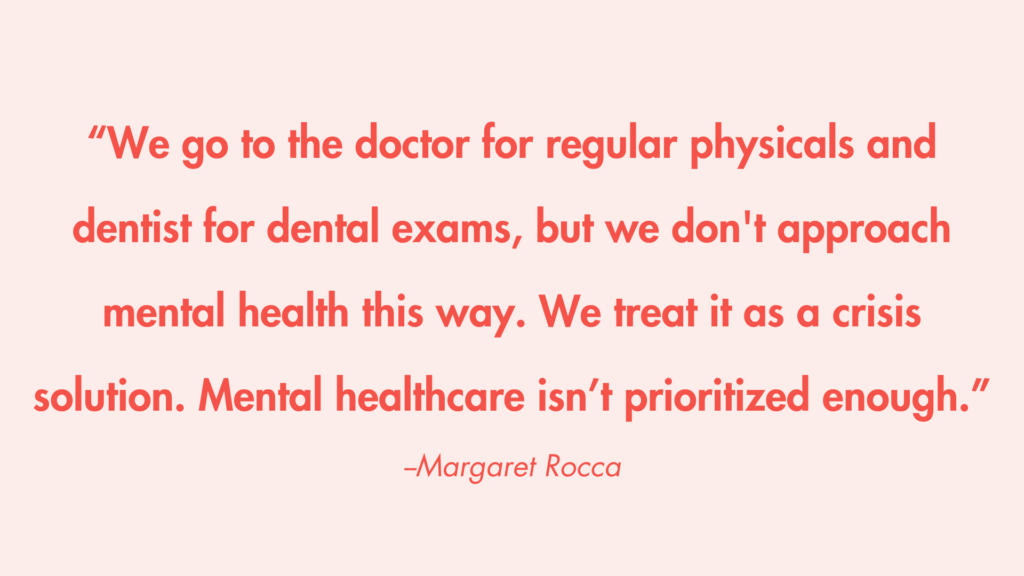The Intersection of Chronic Illness and Mental Health
October 21, 2024
Interview with Lauren Perna, CEO & Lead Writer of Lauren Perna Communications and Mental Health Advocate, and Margaret Rocca, Licensed Mental Health Counselor with Continuity Counseling.
All types of mental illnesses are chronic conditions, though we don’t often think of them that way. As a society, we’ve often swept mental health under the rug, doing a disservice to people diagnosed with depression, anxiety, ADHD, and other mental health-related conditions. When we talk about mental health conditions in the same manner as physical health conditions, we can shift the narrative, remove the stigma, and ensure people have access to the support they need.
In a conversation for Mental Health Awareness Month, Lauren Perna and Maggie Rocca discussed:
- Why patients with chronic illness also experience mental health conditions at higher rates
- The rise of self-diagnosis via social media
- How to advocate for yourself and access mental health care
Related Article: Ambitious Women Thriving with Chronic Conditions: Jessica March
Why Chronic Conditions Often Lead To Mental Health Conditions
As Lauren Perna, a mental health advocate, notes, “It’s important we bring light to the fact that mental health conditions are also more common if you are a patient with a rare or chronic illness. Patients with these illnesses have a higher rate of anxiety, depression, and mood disorders.”
Maggie Rocca, Licensed Mental Health Counselor with Continuity Counseling, explains that there are a number of factors that could lead patients with chronic conditions to also experience a mental health condition.
Rocca noted, “If you’re diagnosed with a chronic condition as a minor under the age of 18 who doesn’t have the rights to make medical decisions on your own, that can be really scary.” Patients of all ages often experience a lack of bodily autonomy, which is just one of many factors that could lead to mental health conditions.
Another factor could be the diagnostic odyssey–the process that patients go through to receive a diagnosis, which often takes months or years. Rocca says, “When you’re not given a solution or answer, your reaction is to feel sad and hopeless, and it takes time to get out of that.”
Another facet is receiving the diagnosis itself. This often leads to a slew of new information, tests and treatments, and coping with what life might look like in the future. “It makes sense that, if you had these outward manifestations of illness going on, it may result in some instability in your mood, anxiety, and depression,” Rocca explains.
On the other hand, “Sometimes patients are happy walking out of the doctor’s office because they finally have a diagnosis. Having a label for what’s been going on is validating,” she says.
In short, being diagnosed with a chronic condition is complex, and there is not one right way to think or feel about it. Every person’s experience will differ, and other external factors, like navigating the healthcare system and the overall stigma surrounding chronic conditions, all play a role.
Read More: Embracing Self-Worth as a Chronic Boss
The Rise of Self-Diagnosis with Social Media
Social media has played a pivotal role in de-stigmatizing mental health conditions and normalizing mental health care, but it has also contributed to an increase in misinformation. Rocca urges social media users to avoid taking medical advice from people online and instead seek professional guidance. Social media can be a tool for education, but it’s important to vet the source.
One of Rocca’s main concerns with social media is that mental health conditions are generalized within brief social media content that paints a simplistic picture of complex conditions. She also likened social media to a game of telephone; information gets passed from one user to another, with key information being lost along the way.
She recommends talking with your provider about all physical and mental health symptoms, who will look at your specific circumstances and health history to provide accurate recommendations.
“You can’t try to fix or fully understand your mental health through a social media post,” Perna notes.
Advocating For Your Mental Health

“We go to the doctor for regular physicals and dentist for dental exams, but we don’t approach mental health this way. We treat it as a crisis solution. Mental healthcare isn’t prioritized enough,” Rocca says.
Perna explains, “Everything is so connected. Nothing should live in a vacuum, whether it’s your mental health, your physical health, or your chronic condition. You really need to be open with all of your doctors and yourself about what your needs are.”
You can prioritize your own mental health by seeking out a mental health professional for regular maintenance care, and “be honest about how you’re feeling and the support you need because this justifies the care that you deserve,” says Rocca.
Being honest about mental health isn’t always easy, but a professional mental health care provider can’t help if they don’t know what is going on.
She also notes that simply relying on friends and family to talk to isn’t a sufficient solution because they aren’t trained to identify mental health conditions or to handle processing the information you share with them.
“Just because someone else deals with problems without mental health support doesn’t mean there’s anything wrong with you needing to seek support. If you feel like you need the extra support, you haven’t failed. Look at mental health as something preventative,” Rocca urges.
Tips for Accessing Mental Health Care
- Understand what your insurance covers when it comes to mental health care. Knowing things like what’s in-network versus out-of-network will help you avoid out-of-pocket costs. *Tip: ask your primary care provider for an in-network referral.
- Consider telehealth options, which can be more accessible financially and physically.
- Read reviews of mental health care providers on websites like Psychology Today, and try to find a provider who has experience with the same types of conditions as you have.
- Try out different mental health care providers to find one you feel comfortable being open and honest with, and look for someone with a communication style that you connect with.
- Talk with your friends and family about therapy; this can help normalize mental health care and they may have tips from their own experiences.
The Chronic Boss Collective is a community for ambitious women living with chronic conditions, including mental health conditions like anxiety, depression, ADD, ADHD, bipolar disorder, and more.
If you’re a Chronic Boss looking to connect with a community of women who “get it,” join our newsletter for more information!

Lauren Perna is the CEO and Head Writer of Lauren Perna Communications, a mental health advocate, and an award-winning community leader. Bringing over 20 years of experience in writing, marketing, and relationship-building to her business, Lauren is an accomplished entrepreneur and writer known for turning even the most complex text into a compelling story.

